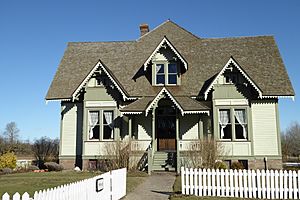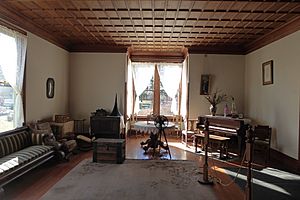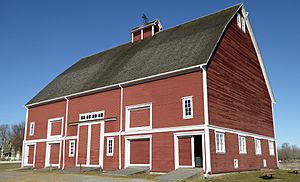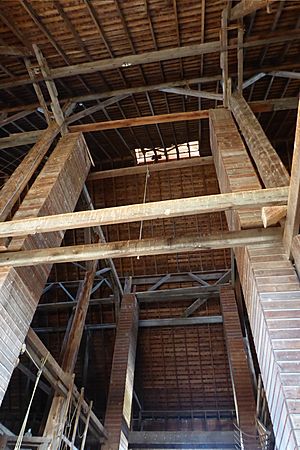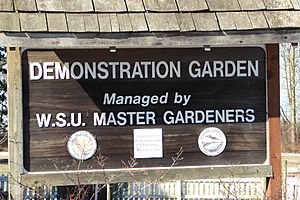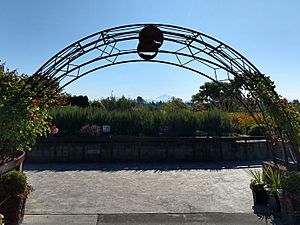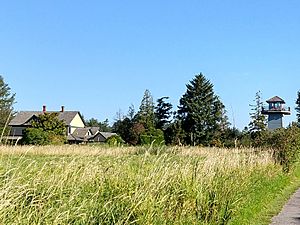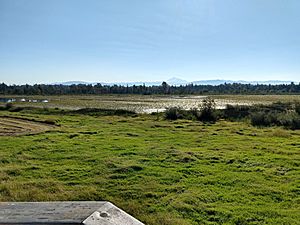Hovander Homestead Park facts for kids
Quick facts for kids |
|
|
Hovander Homestead
|
|
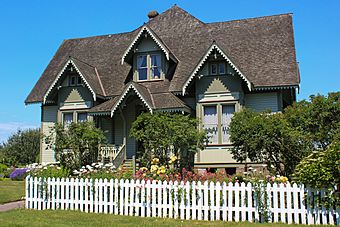
Hovander Homestead farmhouse
|
|
| Lua error in Module:Location_map at line 420: attempt to index field 'wikibase' (a nil value). | |
| Location | 5299 Neilson Rd., Ferndale, Washington |
|---|---|
| Area | 60 acres (24 ha) |
| Built | 1901 |
| Architect | Hovander,Holan O. |
| Architectural style | Stick/eastlake |
| NRHP reference No. | 74001990 |
| Added to NRHP | October 16, 1974 |
Hovander Homestead Park is a large county park near Ferndale, Washington. It covers about 350 acres and includes access to Tennant Lake. The park also borders the Nooksack River.
This special park is named after the Hovander family. They moved here from Sweden in 1898. The family designed their farmhouse, barn, and other buildings. Some of these buildings have very unique designs. The Hovander family owned the homestead until 1969. Then, the Whatcom County government bought the land. It officially became a county park in 1971.
The park helps us see what life was like for pioneers in the Northwest during the 1900s. It also keeps the Hovander family's history alive. Hovander Homestead Park was added to the National Register of Historic Places in 1974. This means it's a very important historical site. In 1978, the park won an award for preserving this special place.
Contents
The Hovander Family Story
Hokan Hovander came from Skåne, Sweden. He moved to the Pacific Northwest in 1897 with his wife, Louisa Leontine Johansdatter Lof, and their children. Hokan was an architect and bricklayer. He first settled in Seattle. But later, he moved his family to Ferndale to start a farm.
He arrived in Ferndale in 1898. He paid $4,000 for 60 acres of land by the Nooksack River. This property already had two log cabins, farm animals, and farm tools.
The Unique Farmhouse
In June 1899, Hokan Hovander finished his plans for the family house. He ordered a lot of fir and cedar wood. This wood was soaked in linseed oil for two years. This special treatment made the wood so strong it has never needed more care!
Building the house began in the spring of 1901. A Swedish carpenter named Carl Lindgren did the woodworking.
In the late 1800s, many settlers in the Northwest built homes like those from their old countries. The Hovander farmhouse shows many Scandinavian designs. For example, it has an "egg and dart" trim. This design often means new life. It was changed to fit traditional Scandinavian art.
Another example is the Star of David design on the porch railings. This was a very popular design back then. Other Scandinavian touches include the linseed oil treatment. The house also has large, open rooms with big windows and doorways. The ceilings are very high too.
The farmhouse has no fireplaces. It was one of the first houses in Whatcom County to use a central heating system. Hokan designed special doors between each room. They could open in different ways to move heat around the house. The house was finished in 1903. It had 6,800 square feet with three bedrooms, a library, a dining room, and a kitchen.
The Big Barn
While planning the farmhouse, Hokan also designed the barn. The farmhouse shows Swedish style. But the barn was inspired by barns Hokan saw in the United States. He didn't like the small Swedish barns of that time. He was amazed by the large size and loft designs of American barns.
So, he designed a very big barn with a high ceiling. He hired builders from Bellingham to construct it. Hokan painted the barn with a mix of oil and iron-rich soil. This made it a dull red color. This painting method started in Scandinavia.
The Hovander Homestead is on the Nooksack River's flood lands. Hokan had to build the barn and house on raised platforms. This helped protect them from floods.
Life on the Hovander Homestead
The Hovanders started farming soon after moving into the log cabins. Their first crop was oats. Later, they also grew sweet corn, hay, and dried fruit. They also raised pork. The property came with two fruit orchards. The apple orchard is still at the park today. The family also made their own soap and candles.
Leontine, Hokan's wife, was a trained cook from Sweden. She cooked for her family and the farm workers. In Sweden, it was common for women to manage the farm when their husbands were away. So, Leontine was well-known and respected by everyone on the farm. The Hovander children went to school in Ferndale. They would walk along pioneer trails or row across the river to get to town.
Soon after arriving, Hokan started a Holstein dairy herd. He began with 12 cows that came with the homestead. By 1919, the herd grew to over 50 cows. Sadly, all the cows got tuberculosis and had to be removed. The Hovanders then got Guernseys instead. Hokan Hovander passed away in 1915 due to poor health. But his family kept running the farm.
Later, two of the youngest Hovander children, Vera and Ada, also got tuberculosis. Ada got better, but Vera died in 1929. Leontine died a few years later in 1936, at 77 years old. After their sister and mother passed, Otis, Charles, and Angelo continued to run the farm. They added raspberries, sugar beets, and chickens to their farm products. Otis was the last Hovander to live on the farm. He continued the family's farming legacy until 1971.
Hovander as a County Park
In 1969, Whatcom County Parks and Recreation bought the Hovander homestead for $60,000. Otis Hovander lived in the house until 1971. That's when the park officially opened to the public. He passed away in 1979.
Between 1969 and 1971, a lot of work was done. The house and barn were repaired and improved. This made them ready for visitors. The farm tools and most items in the farmhouse are real. They were used by the Hovander family. Later, animals were brought in to make the park feel even more like a working homestead.
The Demonstration Garden
In the years that followed, a demonstration garden was created. It shows what the Hovanders' garden might have looked like. It also adds beautiful plants around the farmhouse. This garden is cared for by Whatcom County Parks and Recreation. The Washington State University Extension Service and the Master Gardener Foundation also help. The garden is used for learning and experiments. All the food grown there is given to the local food bank.
Exploring Tennant Lake
The Tennant Lake part of the park has an interpretive center. This center helps you learn about the area. There's also a fragrance garden, a wildlife viewing tower, and a boardwalk. The boardwalk goes over the wetlands next to the lake. It has platforms for viewing wildlife.
The Friends of Tennant Lake and Hovander Homestead Park is a group that supports the park. They say visitors might see amazing birds like bald eagles, coots, ospreys, swallows, ducks, and great blue herons.
Fun Activities at the Park
Many people visit Hovander Homestead Park every year. You can take historical tours led by a park expert. These tours happen in late spring and summer. Families love to bring their children to see the animals and play on the playground.
There are benches throughout the park for resting. A trail runs along the river between Hovander Homestead Park and Tennant Lake. From this trail, you can see beautiful views of Mount Baker.
The park is also a popular place for events. People have weddings, family get-togethers, birthday parties, and photo shoots here. This is because of the unique buildings and lovely scenery. Annual events like Ski to Sea and the Highland Scottish Games are also held at the park.


